| (insert your NIE or newspaper logo here) |
Weekly Online LessonOnline Lesson ArchiveGrade Level: 7-12
|
Saudi Arabia's Balancing Act
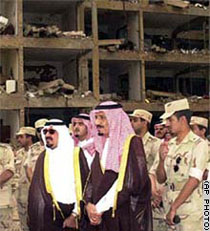 Bomb blasts rocked the capital of Saudi Arabia Monday, May 12, 2003, when suicide bombers drove trucks into three apartment complexes in Riyadh. The explosions killed 34 people, including eight Americans, seven Saudis, three Filipinos, two Jordanians, one each from Australia, Britain, Ireland, Lebanon and Switzerland, plus the nine people the Saudis have identified as attackers. Over 200 people were wounded.
Bomb blasts rocked the capital of Saudi Arabia Monday, May 12, 2003, when suicide bombers drove trucks into three apartment complexes in Riyadh. The explosions killed 34 people, including eight Americans, seven Saudis, three Filipinos, two Jordanians, one each from Australia, Britain, Ireland, Lebanon and Switzerland, plus the nine people the Saudis have identified as attackers. Over 200 people were wounded.
U.S. officials say they suspect the bombing was coordinated by the al Qaeda terrorist network and that similar attacks may be planned for additional American targets within Saudi Arabia. Meanwhile, Saudi authorities appealed to the public for help in apprehending 19 suspected terrorists after seizing a cache of explosives and weapons.
Saudi Arabia is the birthplace of Islam and home to its holy city of Mecca. But the nation's rapport with the United States -- allowing thousands of military troops and American civilians to live and work there, for example -- has made it a prime target of al Qaeda. It's certainly no secret that Osama bin Laden has said that this is a core grievance in his self-proclaimed holy war against the United States.
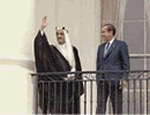 Distrust of the U.S. by nations in the Persian Gulf region has worsened since the war in Iraq began last March, and some say the downward trend began as early as 1991 with Desert Storm.
Distrust of the U.S. by nations in the Persian Gulf region has worsened since the war in Iraq began last March, and some say the downward trend began as early as 1991 with Desert Storm.
Regardless of its beginning, however, Saudi Arabia's support for the U.S. here has led their neighbors, as well as their own citizens, to criticize and question their ties to the U.S. This is a serious concern for the Saudi government, and for the United States.
To maintain its leading role in this region, Saudi officials must strike an acceptable balance between their country's need for security, its crucial international relations, and its credibility in the minds and hearts of its own citizens.
So this week, you'll be traveling to Saudi Arabia for a tour of the country to get to know the place and its people. Then you'll investigate the complexities of U.S.-Saudi relations to understand how they could shape our future.
The Cornerstones of the Country
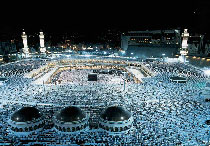 Let's stop at the Royal Embassy of Saudi Arabia in Washington, D.C. to hop on the Country Profile tour. Read the Introduction to get a quick lay of the land. Do you see Riyadh, Makkah (a.k.a., "Mecca"), and Iraq on the map? What other countries are in the region?
Let's stop at the Royal Embassy of Saudi Arabia in Washington, D.C. to hop on the Country Profile tour. Read the Introduction to get a quick lay of the land. Do you see Riyadh, Makkah (a.k.a., "Mecca"), and Iraq on the map? What other countries are in the region?
Use the navigation bar on the left to guide you through the tour, beginning with Saudi Arabia's History. After the overview, read about the area's Early History, Islam History, Modern History, and The Legacy and the Future.
How did the country's geographical location shape its development over time? What event marked the beginning of the modern state of Saudi Arabia? What role does the religion of Islam play in the nation's social and political systems?
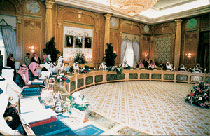 Explore the next two sections of the profile, Islam and Government. Why is Saudi Arabia "Islam's Heartland"? In what ways is the Saudi government's fundamental principles and structure different from that of the American government? Can you identify any similarities?
Explore the next two sections of the profile, Islam and Government. Why is Saudi Arabia "Islam's Heartland"? In what ways is the Saudi government's fundamental principles and structure different from that of the American government? Can you identify any similarities?
Make sure to also meet the Goverment Officials, with King Fahd greeting you at the head of the line. Remember, these are the major players who shape the nation's identity and its role in international affairs. Once you've met them, how do you think each man's education, experience and interests have contributed to the development of their modern government and their country as a whole?
Saudi Society
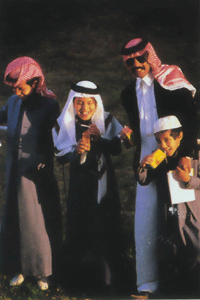 Now let's get out on the streets and browse other sectors of Saudi society. Wander through the area and explore:
Now let's get out on the streets and browse other sectors of Saudi society. Wander through the area and explore:
- Education & Human Services
- Economy & Industry
- Energy & Minerals
- Agriculture & Water Resources
- Health & Social Services
- Transportation & Communication
- Sports & Recreation
- Culture & The Arts
How are the different parts of modern Saudi society interrelated? How have they been influenced by the region's history and its environment? What are the nation's most important natural resources, and how have they developed them? What have they done to build their social and economic systems?
Based on what you know of its neighboring countries, how does Saudi Arabia compare in how much they've invested in modernizing their society? How do you think that affects their relationships with those countries?
Saudi-American Relations
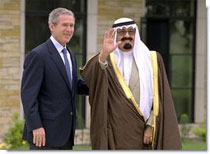 The Middle East has had ties to the West for a long time, as you'll discover at The Saudi-US Relations Information Service.
The Middle East has had ties to the West for a long time, as you'll discover at The Saudi-US Relations Information Service.
Begin here by browsing the brief History and the overview of its International Relations. What is the Arab League, and how might Saudi Arabia's place in the league affect its relationship with the U.S.?
Next find out what some of the key factors are in Saudi-U.S. relations, including Defense/Security, Energy, and Economy/Business. Why does the United States, including American businesses, care about Saudi oil production? Why are electricity and solar power also important energy sources to Saudi Arabia?
What are the three key components of Saudi Arabia's economic strategy? How do you think those relate to ties with the United States? How about with other countries, particularly their neighbors?
Lastly on this trip, read Sandra Mackey's article, Saudi Arabia: Winds of Change in the Desert and the Remarks by the President after meeting with Crown Prince of Saudi Arabia last month.
Why are the leaders of both the U.S. and Saudi Arabia concerned about their relationship? What steps are they taking and specific statements are they making to work through the challenges of being allies? How do the economic and security goals, as well as the sentiments of their citizens, influence these political relationships? In what ways do they not matter?
Newspaper Activities
In a current issue of Targetnewspaper, find articles about events in Saudi Arabia or news about Saudi-American relations. What exactly happened? Does it, or will it, affect relations between the two countries? If so, in what ways? How does it affect their relations with other countries? How are the leaders of these nations reacting to the events? Are the actions of these leaders predictable or surprising? What do they say are their motives or goals? Are the citizens of their nations reacting differently?
© Copyright 2002
Learners Online, Inc.
